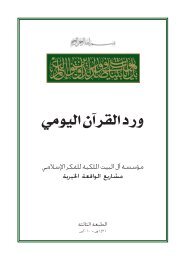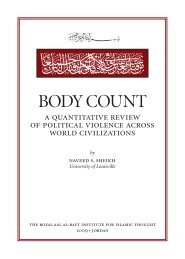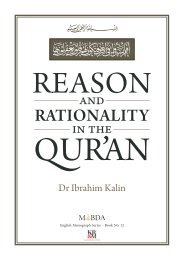Al-W¥^idÏ's Asb¥b al-Nuz‰l - The Royal Islamic Strategic Studies ...
Al-W¥^idÏ's Asb¥b al-Nuz‰l - The Royal Islamic Strategic Studies ...
Al-W¥^idÏ's Asb¥b al-Nuz‰l - The Royal Islamic Strategic Studies ...
Create successful ePaper yourself
Turn your PDF publications into a flip-book with our unique Google optimized e-Paper software.
Asbab <strong>al</strong>-Nuzul<br />
sh<strong>al</strong>l I do’ [As a response] this verse was reve<strong>al</strong>ed (O ye who believe! Enter not houses other than your<br />
own without first announcing your presence and invoking peace upon the folk thereof)”. 10<br />
<strong>The</strong> commentators of the Qur’an said: “When this verse was reve<strong>al</strong>ed, Abu Bakr <strong>al</strong>-Siddiq, may <strong>Al</strong>lah be<br />
well pleased with him, said: ‘O Messenger of <strong>Al</strong>lah, what about the inns and houses <strong>al</strong>ong the roads of<br />
Syria which are uninhabited’ <strong>Al</strong>lah, ex<strong>al</strong>ted is He, then reve<strong>al</strong>ed ((It is) no sin for you to enter uninhabited<br />
houses) [24:29]”. 11<br />
(And such of your slaves as seek a writing (of emancipation), write it for them…) [24:33].<br />
This verse was reve<strong>al</strong>ed about a slave of Huwaytib ibn ‘Abd <strong>al</strong>-‘Uzza who was c<strong>al</strong>led Subayh. <strong>The</strong> latter<br />
asked his master for a writing of emancipation but he refused. When <strong>Al</strong>lah, ex<strong>al</strong>ted is He, reve<strong>al</strong>ed this<br />
verse, Huwaytib agreed to write a letter of emancipation in exchange for a hundred pieces of gold. Out<br />
of this sum, he offered him twenty pieces of gold which he paid. But he was killed in war at the Battle of<br />
Hunayn. 12<br />
(Force not your slave-girls to whoredom that ye may seek enjoyment of the life of the world, if they<br />
would preserve their chastity) [24:33].<br />
Ahmad ibn <strong>al</strong>-Hasan <strong>al</strong>-Qadi informed us> the chamberlain of Ahmad <strong>al</strong>-Tusi> Muhammad ibn Hamdan><br />
Abu Mu‘awiyah> <strong>al</strong>-A‘mash> Abu Sufyan> Jabir who said: “‘Abd <strong>Al</strong>lah ibn Ubayy used to say to a<br />
slave-girl of his: ‘Go and earn something for us from whoring’, and so <strong>Al</strong>lah, glorious and majestic is He,<br />
reve<strong>al</strong>ed (Force not your slave-girls to whoredom) up to His words (<strong>Al</strong>lah will be Forgiving, Merciful!)”. 13<br />
Narrated by Muslim from Abu Kurayb from Abu Mu‘awiyah.<br />
<strong>Al</strong>-Hasan ibn Muhammad <strong>al</strong>-Farisi informed us> Muhammad ibn ‘Abd <strong>Al</strong>lah ibn Hamdun> Ahmad<br />
ibn <strong>al</strong>-Hasan <strong>al</strong>-Hafiz> Muhammad ibn Yahya> Isma‘il ibn Abi Uways> M<strong>al</strong>ik> Ibn Shihab> ‘Umar ibn<br />
Thabit who related that the verse (Force not your slave-girls to whoredom) was reve<strong>al</strong>ed about Mu‘adhah,<br />
the slave-girl of ‘Abd <strong>Al</strong>lah ibn Ubayy ibn S<strong>al</strong>ul. 14<br />
And through this chain of transmission> Muhammad ibn Yahya> ‘Ayyash ibn <strong>al</strong>-W<strong>al</strong>id> ‘Abd <strong>al</strong>-A‘la><br />
Muhammad ibn Ishaq> <strong>al</strong>-Zuhri> ‘Umar ibn Thabit who said: “Mu‘adhah was Muslim as well as being<br />
the slave-girl of ‘Abd <strong>Al</strong>lah ibn Ubayy ibn S<strong>al</strong>ul. <strong>The</strong> latter used to force her to whoredom, and so <strong>Al</strong>lah,<br />
ex<strong>al</strong>ted is He, reve<strong>al</strong>ed (Force not your slave-girls to whoredom) up to the end of the verse”. 15<br />
Sa‘id ibn Muhammad <strong>al</strong>-Mu’adhdhin informed> Abu ‘<strong>Al</strong>i <strong>al</strong>-Faqih> Abu’l-Qasim <strong>al</strong>-Baghawi> Dawud<br />
ibn ‘Amr> Mansur ibn Abi <strong>al</strong>-Aswad> <strong>al</strong>-A‘mash> Abu Nadrah> Jabir who said: “‘Abd ibn Ubayy used to<br />
have a slave-girl by the name of Musaykah whom he forced to whoredom. And so, <strong>Al</strong>lah, glorious and<br />
majestic is He, reve<strong>al</strong>ed (Force not your slave-girls to whoredom) up to the end of the verse”. 16<br />
10<br />
Tabari, :110-111; Qurtubi, :213; Durr, :171.<br />
11<br />
Qurtubi, :213.<br />
12<br />
Qurtubi, :244; Durr, :190-192 (Suyuti gives different accounts for the occasion of this verse). <strong>The</strong> Battle of Hunayn took<br />
place only a few weeks after the conquest of Mecca. <strong>The</strong> Wawazin and Thaqif tribes mobilized their armies against the Muslims,<br />
fearing a possible attack by them after the f<strong>al</strong>l of Mecca. Even though the Muslims outnumbered their enemies in this battle, they<br />
incurred heavy casu<strong>al</strong>ities. In fact, they were on the brink of a crushing defeat before they r<strong>al</strong>lied round the Messenger of <strong>Al</strong>lah and<br />
successfully defeating their enemy. <strong>The</strong> cost in Muslim lives was huge, though. In their exuberance, the Muslims had thought they<br />
were never going to be defeated by their outnumbered foes. <strong>The</strong>y were taught in a harsh and brut<strong>al</strong> manner that the believers need<br />
more than numbers to gain victory in the battlefield. Cf. Muhammad Husayn Hayk<strong>al</strong>, <strong>The</strong> Life of Muhammad, North American<br />
Trust Publications, 1976, pp. 414-428.<br />
13<br />
Tabari, :132-133; Qurtubi, :254; Durr, :189.<br />
14<br />
Tabari, :133; Qurtubi, :254; Durr, :192.<br />
15<br />
Durr, :193.<br />
16<br />
Tabari, :132-133.<br />
168















